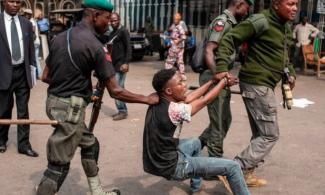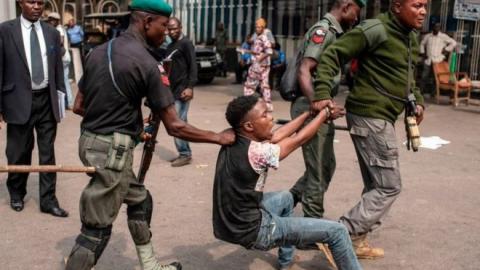
The group also called to enforce the Anti-Torture Law of Nigeria (2017), a law that prohibits torture, cruel treatment of individuals.
The Rule of Law And Accountability Advocacy Centre (RULAAC) says Nigeria has failed to fulfil its voluntarily undertaken obligations under regional and international human rights and humanitarian laws prohibiting torture.
The group also called to enforce the Anti-Torture Law of Nigeria (2017), a law that prohibits torture, cruel treatment of individuals.

Okechukwu Nwanguma, Executive Director of RULAAC, in a statement commemorating the 2021 International Day in Support of Victims of Torture, said the culture of violence inherited from the colonial police remains within the Nigeria police.
Nwanguma added that President Muhammadu Buhari's shoot-at-sight order and the Inspector General of Police's order to officers to act without regards to the rules of engagement and without sensitivity to the respect and protection of human rights all help to promote the culture of violence, including torture.
Read the full statement below:
"The Nigerian Constitution prohibits torture. The African Charter on Human and People's Rights (Ratification and Enforcement) Act prohibits and criminalises torture.
"The Anti-Torture Act was passed and signed into law in 2017. The Administration of Criminal Justice Act (ACJA), which repealed and replaced the colonial Criminal Act and Criminal Code, was passed in 2015 after Lagos State had passed the Administration of Criminal Justice Law (ACJL) in 2007 and revised it in 2011. Many other states have followed suit by adapting and passing versions of the ACJL in their various states.
"The violence against persons (Prohibition) Act was passed in 2015. The Convention on the Elimination of all forms of Discrimination against Women (CEDAW) was passed in 1981; Nigeria ratified it without reservation in 1985, signed the Optional Protocol in 2000 and ratified it in 2004. Nigeria has also domesticated the Child Rights Act
"The new Police Act passed and signed into law in 2020 also criminalises and expressly prohibits the use of torture by the police. The framework of legal standards on policing in Nigeria also includes international laws and treaties and laws accepted by or applicable to Nigeria as a member of the international community.
"Despite these enactments, commitments, reforms and 'revolutionary changes' in criminal justice laws and legislation, the practice of torture remains widespread in law enforcement practices in Nigeria just as lawlessness and violence remain the defining features of national life in Nigeria.
"The culture of violence inherited from the colonial police remains within the Nigeria police. Many police officers still believe that torture is a legitimate means of interrogation. Police training has not succeeded in changing this colonial culture and orientation of violence and subjugation. Many citizens also leave with the wrong notion that torture is a standard and legitimate way to extract the truth. But torture is a crime in Nigeria, as seen from the array of local laws and international legislation and standards that Nigeria subscribes to. It is also a transnational crime classified among crimes against humanity under the Rome Statute.
"It is our view that the government has not demonstrated genuine commitment to end torture and the culture of violence in Nigeria. President Buhari's shoot-at-sight orders and the Inspector General of Police's orders to police officers to act without regard to the rules of engagement and without sensitivity to the respect and protection of human rights all help promote the culture of violence, including torture.
"Several laws that aim to promote professionalism and respect for human rights in law enforcement practices are not strictly implemented and enforced by the leadership at both law enforcement and political levels.
"All staff of the Nigeria Police ought to be conversant with and have access to these applicable laws and standards. However, in its 2006 report, the Presidential Committee on Police Reform acknowledged that 'these important regulatory books that all officers must acquaint themselves with are either in short supply or no longer in circulation.
"The result is that many young police officers are not familiar with them, to the detriment of their professional competence.
"The situation has not changed. Awareness remains very low among law enforcement officials of the laws that should guide law enforcement practices. The laws are also not available for use by law enforcement officials. Research conducted by RULAAC on the awareness and implementation of the ACJA among police officers in Lagos and Anambra states shows that awareness is very low. The laws are also not available."
"Lack of accountability and redress for the crime of torture. Officers who commit torture are not punished according to the law. Victims are never given justice.
"Lack of adequate funding, equipment and operational facilities hamper the ability to effectively implement the laws and discharge the obligations contained in the laws. Without sufficient funds and facilities, it isn't easy to ensure effective compliance with aspects of the laws. For example, some provisions of the ACJA/ACJL, such as the requirement that interrogation of criminal suspects shall, among others, be video-recorded, cannot be complied with partly due to lack of facilities and funds to procure the facilities necessary to give effect to this provision.
"The British Council had in the past provided sample Statement Taking Rooms in selected police stations in Lagos and Anambra States and equipped them with cameras and other equipment. This was to promote effective implementation of the ACJA concerning video recording of interrogations and help reduce the torture of criminal suspects during interrogations. But the facilities were never put to use in any of the pilot police stations and were vandalised in some of the stations.
"Without the infrastructure and skills to support the criminal investigation, the NPF is institutionally unable to respect the presumption of innocence nor maintain credible crime records. Instead, "they now resort to parading suspects in handcuffs and others killed by them extra-judicially, such as armed robbers to impress the general public that they are working, when, at this stage, the innocence of the suspects should be presumed and their human rights protected by the Police.
"The effect of this is a tradition of compromised investigations and unsuccessful prosecutions, which the Nigerian Supreme Court has noted, results "in the acquittal of criminals who should have been convicted."